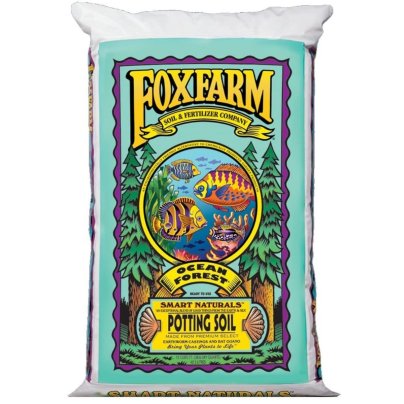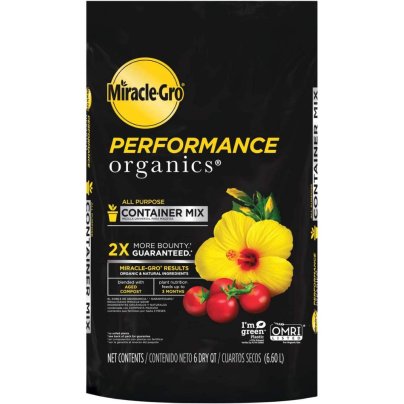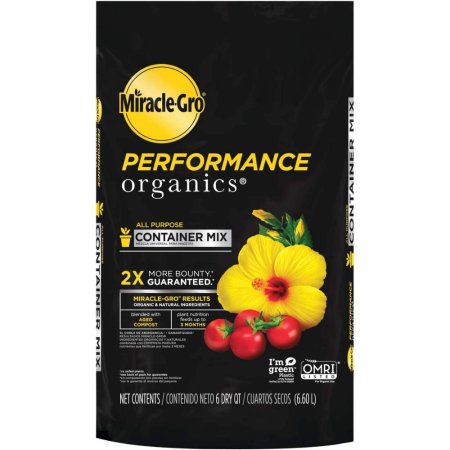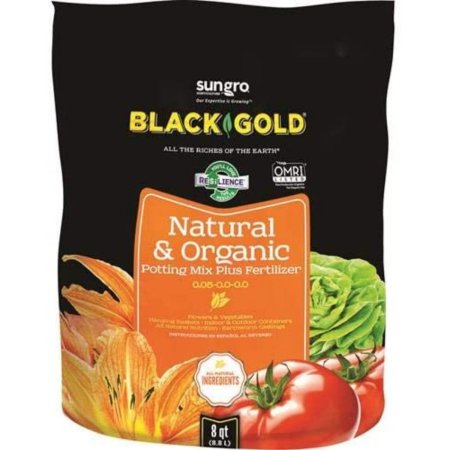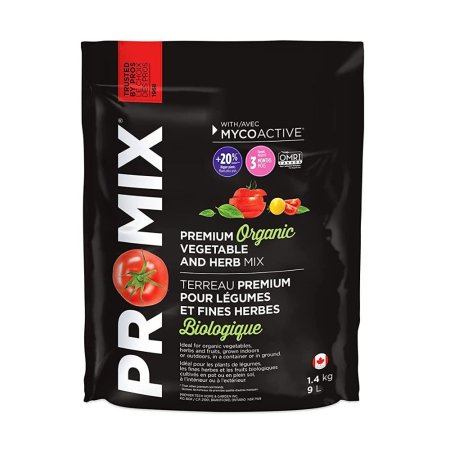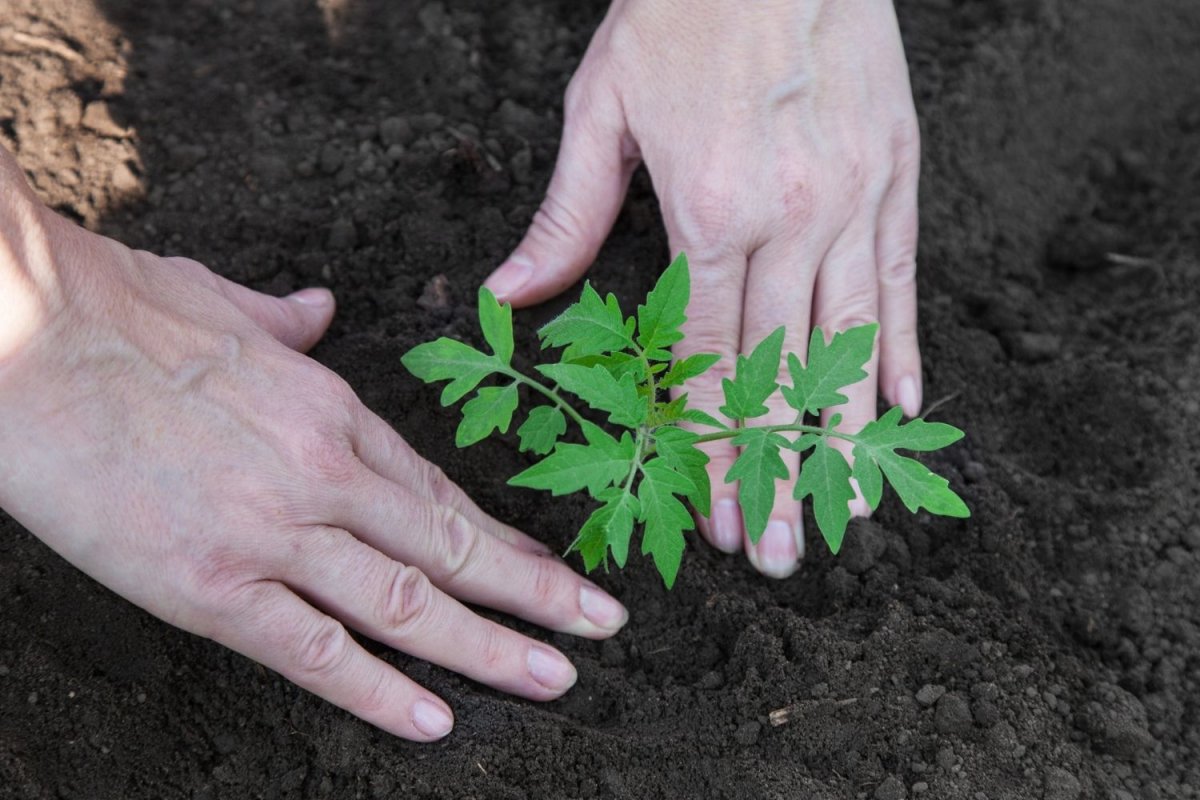
We may earn revenue from the products available on this page and participate in affiliate programs. Learn More ›
With more than a thousand varieties in a wide range of sizes, shapes, and colors, it’s no wonder tomatoes are among the most popular of all backyard-grown produce. As soon as the weather warms in spring, rows upon rows of tomato seedlings appear in garden centers. While this juicy, nutritious favorite is relatively simple to grow, planting the seedlings in good-quality soil helps ensure healthy tomato plants that lead to an abundant harvest.
Tomatoes can be grown in most types of garden soil, except heavy clay, which is too dense and restricts root development. They prefer soil that drains well yet retains enough water to keep their moisture-loving roots from drying out. They also like soil that’s rich in organic matter. The best soil for tomatoes will provide plants with everything they need for robust growth. Our favorite was the Ocean Forest mix from FoxFarm, with its great aeration and nutrient-rich ingredients. Ahead, learn what to look for when choosing (or amending) soil for tomatoes, and find out why the following products are all well suited for growing this summertime favorite.
- BEST OVERALL: FoxFarm Ocean Forest FX14000 Organic Potting Soil
- BEST BANG FOR THE BUCK: Miracle-Gro Performance Organics All-Purpose Mix
- BEST ORGANIC: Sun Gro Black Gold 1302040 All Organic Potting Soil
- BEST MOISTURE-CONTROL: Espoma AP8 8-Quart Organic Potting Mix
- BEST NUTRIENTS: Pro-Mix Organic Vegetable and Herb Potting Mix
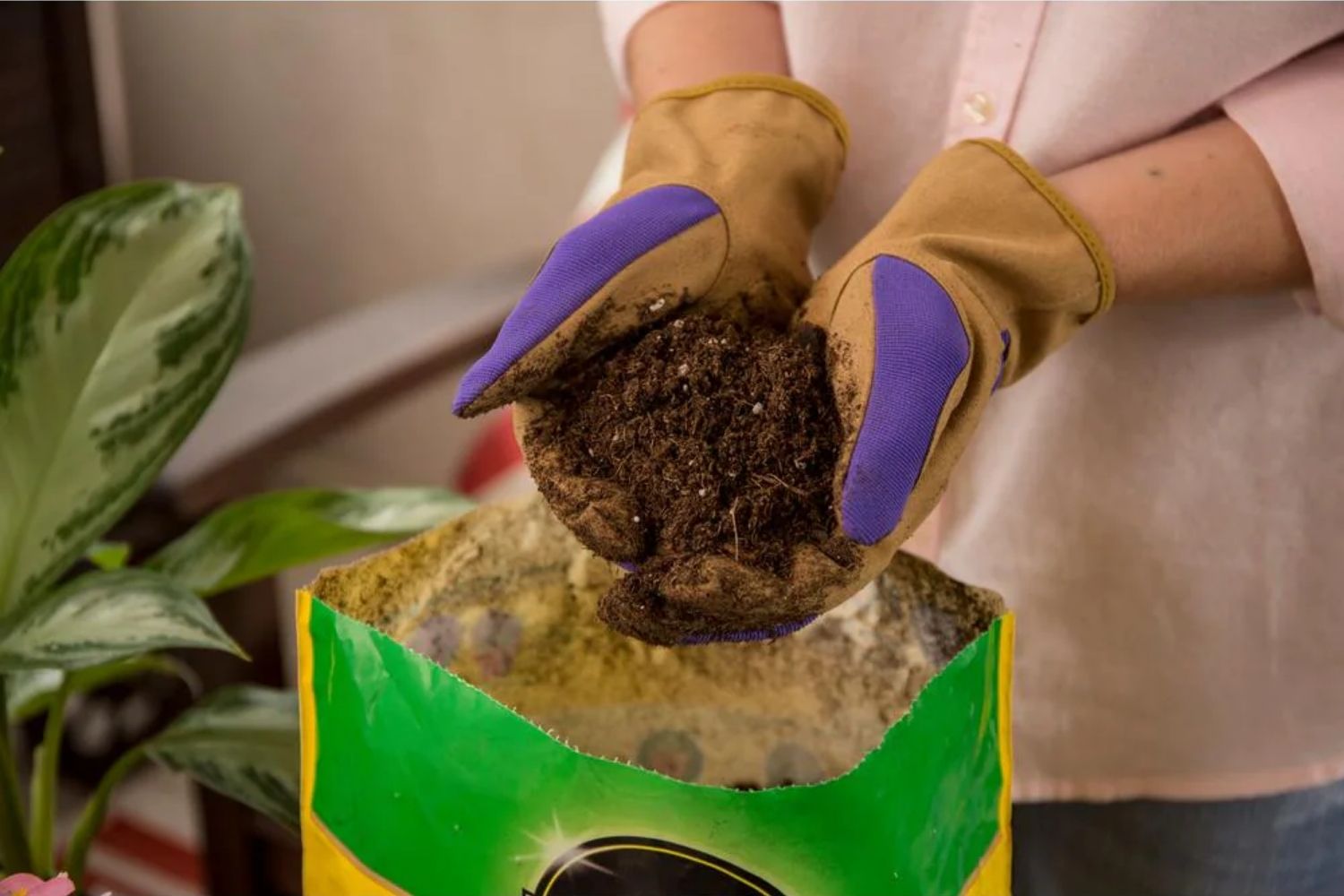
Soil for Tomatoes Comparison Chart
| Product | Key Ingredients | Nutrients | Quantity |
| FoxFarm Ocean Forest FX14000 Organic Potting Soil | Sandy loam, peat moss, forest humus | Bat guano, fish meal, crab meal, earthworm castings | 1.5 cubic feet |
| Miracle-Gro Performance Organics All-Purpose Mix | Yucca, sphagnum peat moss, coconut coir, perlite | Aged compost | 6 quarts |
| Sun Gro Black Gold 1302040 All Organic Potting Soil | Peat moss, loam, perlite, pumice | Compost, earthworm castings, forest humus | 8 quarts |
| Espoma AP8 8-Quart Organic Potting Mix | Peat moss, perlite, humus | Earthworm castings, limestone, Myco-tone (7 species of ectomycorrhizal fungi and 4 species of endomycorrhizal fungi) | 8 quarts |
| Pro-Mix Organic Vegetable and Herb Potting Mix | Sphagnum peat moss, peat humus, composted forest products, coco fiber, perlite | Fertilizer | 9 liters |
Our Top Picks
The following potting soils and growing mixes earned a spot on this lineup by containing ingredients that drain well yet retain some moisture. They also had to include components that prevent soil compaction. Some have added fertilizers and micronutrients while others don’t, yet each is well suited for growing tomato plants.
Best Overall
FoxFarm Ocean Forest FX14000 Organic Potting Soil
What We Like
- Optimal aeration, providing well-draining soil
- Includes a wide variety of nutrient-rich ingredients
- Available in a range of sizes
What We Don’t Like
- Some size options offer better value than others
Product Specs
- Key ingredients: Sandy loam, peat moss, forest humus
- Nutrients: Bat guano, fish meal, crab meal, earthworm castings
- Quantity: 1.5 cubic feet
This premium potting soil from FoxFarm is a well-balanced blend of sphagnum peat moss, sandy loam, and forest humus (composted bark and other plant matter) to create a rich mix that’s well suited to growing tomatoes. Ocean Forest offers optimal drainage, retains moisture between waterings, and is designed not to compress over time.
The soil mix contains added natural ingredients, including bat guano, fish meal, crab meal, and earthworm castings, designed to give tomatoes a healthy natural boost even at the seedling stage. Ocean Forest is pH adjusted and falls between 6.3 and 6.8 on the pH scale, making it well suited for tomato growth. While the mix is not certified as organic, it contains natural ingredients.
Get the FoxFarm soil for tomatoes at Amazon or The Home Depot.
Best Bang for the Buck
Miracle-Gro Performance Organics All-Purpose Mix
What We Like
- Available in lesser quantities for small containers
- Drains efficiently to prevent root rot and other disorders
- Includes added nutrients to feed plants for up to 3 months
What We Don’t Like
- Some users have reported mold growing on top of this fertilizer
Product Specs
- Key ingredients: Yucca, sphagnum peat moss, coconut coir, perlite
- Nutrients: Aged compost
- Quantity: 6 quarts
Here’s a way to grow delicious tomatoes without spending a lot of money. Miracle-Gro Performance Organics all-purpose container mix gives tomato seedlings a strong start, thanks to a blend of sphagnum peat moss, coconut coir, and perlite. It also contains a wetting agent to help the dry peat moss absorb water the first time it’s moistened; once moist, the mix will readily absorb water.
Like most Miracle-Gro soil blends, this product contains fertilizers that give the seedlings an initial burst of growth, so the plants will not need fertilizing for a few months. After that, tomatoes in containers should be regularly fed with a high-phosphorus fertilizer specifically made for growing tomatoes.
Get the Miracle-Gro soil for tomatoes at Amazon.
Best Organic
Sun Gro Black Gold 1302040 All Organic Potting Soil
What We Like
- Drains well but retains moisture between waterings
- Includes a blend of highly nutritious ingredients
- Certified organic by OMRI, this potting soil product is all natural
What We Don’t Like
- The price is slightly higher than some of the others we recommend
Product Specs
- Key ingredients: Peat moss, loam, perlite, pumice
- Nutrients: Compost, earthworm castings, forest humus
- Quantity: 8 quarts
Tomato-growing purists looking for an organic soil mix may wish to use Sun Gro’s Black Gold potting soil. Its Organic Materials Review Institute (OMRI) certification shows that the potting soil is all natural and free from chemicals, and the processes used in its manufacture are nontoxic.
The mix is a blend of rich loam and sphagnum peat moss to which perlite and pumice have been added. Pumice granules, a type of lightweight volcanic rock, help the mixture drain well while adding a bit of structural integrity to help anchor the roots of towering tomato plants. In addition to the base mix, Black Gold contains compost, earthworm castings, and forest humus.
Get the Black Gold soil for tomatoes at Amazon.
Best Moisture Control
Espoma AP8 8-Quart Organic Potting Mix
What We Like
- Designed to reduce plant stress in droughtlike situations
- This potting mix is well draining
- Includes mycorrhiza nutrients
What We Don’t Like
- The price of this soil is slightly higher than some others on the market
Product Specs
- Key ingredients: Peat moss, perlite, humus
- Nutrients: Earthworm castings, limestone, Myco-tone (7 species of ectomycorrhizal fungi and 4 species of endomycorrhizal fungi)
- Quantity: 8 quarts
Growing container tomato plants in warm climates can be tricky if the plants are not frequently watered. Rather than fret over a missed watering, consider using this Espoma organic potting mix. Myco-tone, the company’s proprietary blend of mycorrhizae (mushroom-based) components, promotes water uptake in the plants’ roots while reducing the stress that can happen if the soil dries out.
With Espoma organic potting mix, tomato plants develop strong roots and require up to 30 percent less water to remain healthy. The soil mix includes a combination of sphagnum peat moss, perlite, and humus. In addition to Myco-tone, the mixture has also been enhanced with earthworm castings and limestone.
Get the Espoma soil for tomatoes at Amazon.
Best Nutrients
Pro-Mix Organic Vegetable and Herb Potting Mix
What We Like
- Includes a slow-release fertilizer that feeds plants for 3 months
- Designed to ensure proper drainage and soil aeration
- Limestone is added to the formula to balance pH levels in the soil
What We Don’t Like
- Not as readily available as some of the others we recommend
Product Specs
- Key ingredients: Sphagnum peat moss, peat humus, composted forest products, coco fiber, perlite
- Nutrients: Fertilizer
- Quantity: 9 liters
Those shopping for a premium grow mix that contains added natural nutrients need look no further than Pro-Mix’s organic vegetable and herb potting mix. It’s made from a blend of sphagnum peat moss, perlite, and peat humus. The combination provides a soil that drains well yet retains enough moisture between waterings to keep tomatoes happy.
This potting mix includes added nutrients in the form of microbes and slow-release fertilizer that feed tomato plants for up to 3 months. It’s a great choice for gardeners who need help balancing their soil’s pH level because added limestone acts as a pH adjuster that ensures the soil will be within a suitable pH range for growing a variety of fruits and vegetables—including tomatoes.
Get the Pro-Mix soil for tomatoes at Amazon.
Jump to Our Top Picks
How We Chose the Best Soil for Tomatoes
Before selecting the soil mixes for this lineup, we extensively researched dozens of products, eliminating those that drain poorly as well as those that drain too much and don’t retain adequate moisture. We also prioritized ingredients that are environmentally friendly. For this reason, we did not include some popular options, like Miracle-Gro Potting Mix, because of their potentially harmful ingredients.
Once we found the ideal sweet spot, we narrowed the field to only those products that would not compress over time. Compression is a common problem when growing tomatoes in containers because it makes the soil dry too quickly.
We also considered manufacturer reputation, since nationally known brands have a solid following and track record. Still, we also looked at smaller niche-type manufacturers that won us over with their high-quality ingredients and premium blends.
What to Consider When Choosing Soil for Tomatoes
Every summer, an unspoken competition occurs in communities across the nation, with home gardeners vying to grow bigger, healthier, and better-tasting tomatoes than their neighbors. Some growers spend years amending their garden soil by adding compost and organic matter until it’s just right for producing a prize-worthy crop. However, even newbies can produce delicious tomatoes—just by planting them in optimal soil.
Soil Type
Most home gardeners plant tomato seeds or seedlings directly in the garden or in raised beds to increase drainage, but tomatoes can also be successfully grown in containers or in grow bags (lightweight coated fabric bags that hold 5 to 20 gallons of soil) as long as the soil is suitable.
Filling containers or grow bags with dirt from the garden won’t work because soil in containers dries out more quickly than it does in the garden. Unless you’re willing to water two or three times a day, the tomatoes’ roots can dry out and stunt the plant’s growth. In addition to drying out quickly, garden soil is more likely to become compressed, which makes it difficult for tomato roots to develop.
A commercial growing mix is better suited to tomatoes planted in containers because it contains components such as bark and coco coir that keep the soil from compressing while maintaining a measure of moisture. A good growing mix can also be used to amend the soil in gardens and raised beds for better results. Simply work any of the soil picks in this lineup into the top few inches of existing garden soil to enrich it and increase drainage. The ingredients in commercial soil typically include one or more of the following components.
- Bark: Harvested from pine or fir trees, bark helps keep the soil light so roots have room to grow.
- Peat moss: Often the main ingredient in growing mixes and quite common in tomato and vegetable blends, peat moss (moss harvested from peat bogs) absorbs water, then gradually releases it to keep tomatoes’ roots from drying out.
- Coir: Sourced from the inside of coconut shells, coconut coir keeps soil from becoming compressed. It also absorbs moisture and releases it slowly to help keep roots adequately hydrated.
- Perlite: A byproduct of volcanic glass, perlite helps keep soil fluffy, preventing soil compaction.
- Sand: Horticultural sand may be added to the mix to encourage drainage. It can also give the soil more structural integrity to anchor the roots of tall tomato plants and keep them from toppling over.
- Wetting agent: Some soil mixes are semi-damp when packaged, and others are completely dry. Dry mixes that contain peat moss can be challenging to moisten the first time, as the moss tends to float rather than absorb water. A wetting agent helps the moss absorb water for the initial moistening, after which it will absorb water easily.
Nutrients
Tomatoes thrive when grown in rich soil containing minerals and micronutrients, such as phosphorus, potassium, calcium, magnesium, and potash. Tomato fertilizers are typically high in phosphorus, which is indicated by the middle number of the product’s nitrogen (N), phosphorus (P), and potassium (K) ratio. A suitable tomato fertilizer usually has a higher middle number in its NPK ratio, such as 5-7-3 or 8-15-6. However, the ratio can vary from product to product based on whether the fertilizer is designed just for tomatoes or for other plants as well.
Some growing mixes contain natural or synthetic nutrients, while others don’t. Even if a soil mix has added fertilizer, container plants may benefit from a dose of fertilizer made specifically for tomatoes every 6 weeks or so. The reason? Nutrients tend to wash out of container soil more quickly than garden soil, and tomatoes thrive on a high level of nutrients. Information on the bag of potting mix will indicate how long to wait before starting a regular fertilizer routine.
pH Level
The optimal pH level for growing tomatoes is neutral to slightly acidic. The pH scale ranges from 0 to 14, with 7 considered neutral. Numbers below 7 are progressively more acidic, and numbers above 7 are progressively more alkaline.
Tomatoes flourish in soil that ranges from around 6 to 7 on the pH scale. Soil that contains ample organic matter, such as dried leaves and compost, usually falls within that range. Soil heavy in clay can be too alkaline, resulting in stunted tomato growth, but the pH level can often be lowered by amending it with organic matter, such as composted vegetable scraps or composted leaves.
Not all commercial soil mixes list the product’s pH level. Fortunately, determining soil pH is easy to do with an inexpensive soil tester available from any gardening center.
Moisture Level
Tomatoes love water—but not standing water. Growing tomatoes in a pot that won’t drain can lead to root rot or a weak plant. The best soil for healthy tomatoes will allow water to drain yet remain moist (not soggy) to keep roots happy.
Both peat moss and coco coir are well suited for healthy drainage and moisture retention. Both also help to keep the soil from becoming compacted so tomato roots can grow without resistance.
In the garden, tomato plants need 1 to 2 inches of water per week, which may mean watering every other day. Tomatoes may benefit from daily watering in containers because the soil dries out more quickly, especially in hot weather.
Versatility
The best soil for tomatoes is also beneficial for other vegetables, such as peppers, cucumbers, squash, and okra. These plants, and others, all enjoy a rich soil that drains well yet retains a modicum of moisture. In addition, some commercial soil mixes that are well suited to tomatoes can also be used to grow indoor houseplants—just make sure the mix is labeled for indoor and outdoor use.
If filling up entire raised beds or a garden plot with a commercial soil mix is cost prohibitive, consider amending the existing soil with a good mix to make it better suited for tomatoes. To amend an existing bed, add several inches of soil mix to the top of the soil and work it in with a trowel to a depth of about 4 inches. Tomato plants have relatively shallow roots, so it’s unnecessary to work the soil any deeper.
Organic
Some soil mixes are labeled as being organic, a designation regulated by the USDA and certified by OMRI. Products bearing the organic label must meet specific criteria, such as being free from chemical and synthetic pesticides, herbicides, and fertilizers. Also, they must be processed without chemicals and toxins.
Home gardeners who want to lead an eco-conscious lifestyle or prefer not to serve anything grown in soil that has artificial ingredients may choose an organic soil mix.
FAQs
Growing tomatoes is a favorite summer pastime, but the neighbors with the best bumper crop may not want to share their secret to success. Newbie home gardeners looking for more info on choosing soil and growing healthy tomatoes are likely to find the answers to their questions here.
The best soil for grow bags should contain both lightweight ingredients such as perlite, to keep it from compacting, and components that retain moisture, like peat moss or bark.
The best soil for grow bags should contain both lightweight ingredients such as perlite, to keep it from compacting, and components that retain moisture, like peat moss or bark.
They like only slightly acidic soil, ranging from 6 to 7 on the pH scale.
Any type of natural compost, including composted wood chips, household compost, or commercial compost, is suitable for adding nutrients to the soil. Avoid using composted manure, as it can be too strong and can burn tender tomato plant roots. Follow the application instructions carefully.
Both are about equal. For the best results, make sure the pot or bag will hold at least 10 gallons of soil to give the tomato roots room to develop.
The recommended minimum size grow bag for tomatoes is 10 gallons. Larger bags are even better.
Yes, it provides an optimal soil for root development. However, keep in mind that because it contains synthetic fertilizers, it is not considered organic.
Amend acidic soil (lower than 6 on the pH scale) by adding ground lime to raise the pH. To lower the soil pH of alkaline soil (over 7 on the pH scale), consider adding compost or peat moss.
